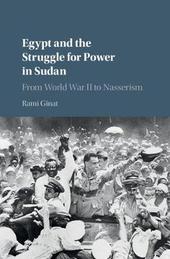
|
Egypt and the Struggle for Power in Sudan: From World War II to Nasserism
Hardback
Main Details
| Title |
Egypt and the Struggle for Power in Sudan: From World War II to Nasserism
|
| Authors and Contributors |
By (author) Rami Ginat
|
| Physical Properties |
| Format:Hardback | | Pages:292 | | Dimensions(mm): Height 235,Width 157 |
|
| ISBN/Barcode |
9781107197930
|
| Classifications | Dewey:962.05 |
|---|
| Audience | | Professional & Vocational | |
|---|
| Illustrations |
Worked examples or Exercises
|
|
Publishing Details |
| Publisher |
Cambridge University Press
|
| Imprint |
Cambridge University Press
|
| Publication Date |
24 August 2017 |
| Publication Country |
United Kingdom
|
Description
For decades, the doctrine of the 'Unity of the Nile Valley' united Egyptians of a variety of political and nationalist backgrounds. Many Egyptians regarded Sudan as an integral part of their homeland, and therefore battled to rid the entire Nile Valley of British imperialism and unite its inhabitants under the Egyptian crown. Here, Rami Ginat provides a vital and important revised account of the history of Egypt's colonialist struggle and their efforts to prove categorically that the Nile Valley constituted a single territorial unit. These were clustered around several dominant theoretical layers: history, geography, economy, culture and ethnography. This book, for both Middle Eastern and African historians, uses a mixture of Arabic and English sources to critically examine the central stages in the historical development of Egypt's doctrine, concentrating on the defining decade (1943-1953) that first witnessed both the pinnacle of the doctrine's struggle and the subsequent shattering of a consensual nationalist dream.
Author Biography
Rami Ginat is a Professor of Middle Eastern politics and heading the Department of Political Studies at Bar-Ilan University, Israel. He is a leading scholar in Egyptian history and Cold War studies in the Middle East, and has published many books and articles in these fields, including A History of Egyptian Communism (2011). His work pays careful attention to the mutual feedback between politics and ideas.
Reviews'Remarkable accomplishment, illuminating and insightful. Egypt and the Struggle for Power in Sudan offers a fresh and original reading of the Egyptian national struggle for unity of the Nile Valley. Combining intellectual with political history, Rami Ginat, examines, in a most sophisticated yet concrete manner, the British-Egyptian rivalry for control and hegemony in Sudan and explains why it culminated dramatically in the 1940s and early 1950s. Ginat systematically and comprehensively reconstructs a broader, multi-vocal system of the Egyptian public's responses to the doctrine of the Nile Valley unification by the ruling elite as well as broader civil society. The book ends with a requiem for the Nile Valley unity dream, shattered by the new 1952 July Revolution regime, who recognized Sudan's right to national self-determination and independence.' Israel Gershoni, Tel-Aviv University 'Based on diligent, impeccable archival research, Ginat challenges deep-rooted nationalist narratives to provide a dispassionate, nuanced look at the complexities - and contradictions - of Egyptian claims to sovereignty over the Nile Valley. Situated within the broad contexts of British imperialism and Egyptian and Sudanese decolonization, this is a splendid work of political and intellectual history.' Joel Gordon, Director of the King Fahd Center, University of Arkansas, and author of Nasser's Blessed Movement: Egypt's Free Officers and the July Revolution '... an in-depth book about a relatively short period of history that saw the unraveling of a complex imperial situation.' Peter Woodward, Middle East Journal '... Remarkable book... It's an illuminating study that explores Sudan's rather unique place in the history of imperialism ... In moving between regional and international levels of analysis, Egypt and the Struggle for Power in Sudan forces historians to rethink certain assumptions about the complex and contradictory relationships between imperialism and nationalist movements, while providing a definitive political and intellectual history of Egypt's postwar struggle for control over Sudan.' Brian Peterson, The American Historical Review
|